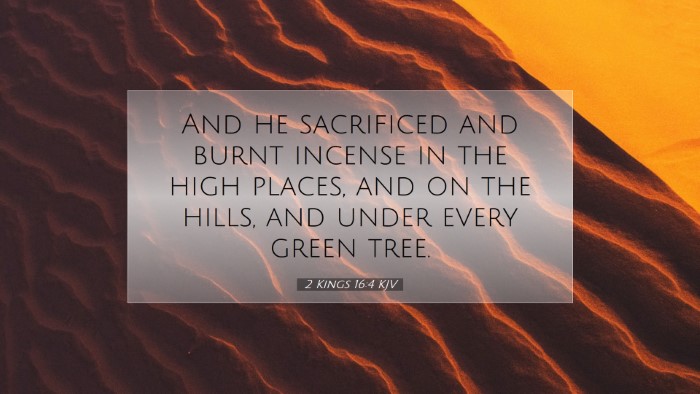Old Testament
Genesis Exodus Leviticus Numbers Deuteronomy Joshua Judges Ruth 1 Samuel 2 Samuel 1 Kings 2 Kings 1 Chronicles 2 Chronicles Ezra Nehemiah Esther Job Psalms Proverbs Ecclesiastes Song of Solomon Isaiah Jeremiah Lamentations Ezekiel Daniel Hosea Joel Amos Obadiah Jonah Micah Nahum Habakkuk Zephaniah Haggai Zechariah Malachi2 Kings 16:4
2 Kings 16:4 KJV
And he sacrificed and burnt incense in the high places, and on the hills, and under every green tree.
2 Kings 16:4 Bible Commentary
Commentary on 2 Kings 16:4
In 2 Kings 16:4, we delve into the reign of King Ahaz of Judah, whose decisions are pivotal in understanding the historical and spiritual context of the nation during his rule. This verse presents significant implications for both the theological and practical aspects of leadership within God's covenant community.
Contextual Background
King Ahaz, son of Jotham and grandson of Uzziah, ascended the throne of Judah during a tumultuous period marked by political strife and moral decline. His actions, specifically in relation to idol worship and alliances with foreign nations, left an indelible impact on the spiritual state of Judah. The records of this reign tell of a king who turned away from Yahweh and embraced practices that were steeped in paganism.
Verse Examination
“And he sacrificed and burned incense in the high places, and on the hills, and under every green tree.” (2 Kings 16:4, KJV) This verse succinctly summarizes Ahaz’s grave transgressions, with multiple layers of meaning to unpack from the actions described.
High Places and Pagan Worship
The phrase “high places” refers to elevated sites where pagan worship was common, signifying a direct violation of the commandments which espoused exclusive worship of Yahweh. Matthew Henry notes that although the Law of Moses strictly prohibited such practices, Ahaz’s actions reflected the prevailing corruption in Israelite religion and government.
Albert Barnes emphasizes that these high places were indicative not merely of geographical elevation but of a spiritual elevation to foreign gods, showcasing Ahaz’s alignment with the polytheistic practices surrounding Judah—a tragic departure from his ancestors’ faithfulness.
The Significance of the Hills
The mention of “the hills” adds to the understanding of the widespread nature of Ahaz’s idolatry. Adam Clarke remarks that the elevation of these sites created an allure for worshippers seeking closeness to their deities, leading to a syncretism of worship practices and a dilution of authentic faith.
Under Every Green Tree
The phrase “under every green tree” signifies the naturalness and ubiquity of idol worship in Judah. The greenery symbolizes fertility and the agricultural fertility gods of the surrounding peoples. Clarke highlights that this reflects an embrace of nature worship—a stark contrast to the worship of the Creator—a foundational aspect of the Israelite identity.
Theological Implications
The decisions made by Ahaz, as illustrated in 2 Kings 16:4, raise profound theological questions regarding idolatry and covenant fidelity. This verse illustrates the susceptibility of God's people to external influences and the dire consequences of disobedience.
The actions of Ahaz serve as a somber reminder for leaders within the church and for all believers. The danger lies not only in the abandonment of God but in the blending of true worship with the cultural norms surrounding them. Both Henry and Barnes point out that the struggles against idolatry in the Old Testament reflect the ongoing battle against spiritual complacency today.
Application for Modern Believers
As we reflect on 2 Kings 16:4, we are called to evaluate our own lives for the subtle influences that may lead us away from true worship. This verse challenges contemporary believers to measure their practices against Biblical teachings and to remain vigilant against the encroachment of secular influences in their spiritual lives.
- Spiritual Vigilance: Much like Ahaz, believers today face numerous pressures that entice them to compromise their faith. The caution is to remain aware of how cultural idols can subtly infiltrate worship.
- The Exclusive Worship of God: Emphasizing the need for undivided devotion to the Lord. Just as Judah struggled with idolatry, modern Christians are reminded to resist the lure of false gods.
- Leadership Responsibility: Leaders in the church are ministered by this scripture to steward their congregation towards righteousness while setting an example of unwavering faithfulness to God.
Conclusion
2 Kings 16:4 stands as a testament to the complex nature of faith, leadership, and communal identity among God's people. The harsh realities of idolatry that Ahaz engaged in serve as a warning and call to action for all who seek to follow the path of righteousness. Through the lens of this verse and the insights gathered from the public domain commentators, we are reminded to adhere closely to the teachings of God and discern carefully the influences that surround us.


